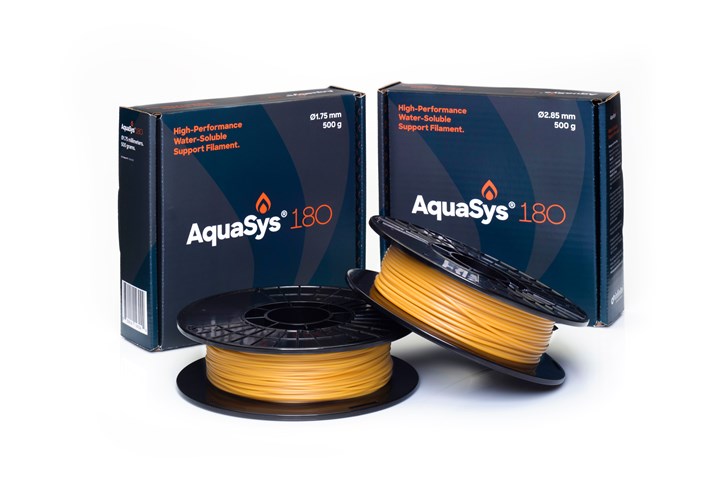Infinite Material Solutions presents water-soluble support material for 3D-printing capabilities
AquaSys 180 is compatible with high-temperature thermoplastics and holds an advantage for the Fused Filament Fabrication (FFF) 3D printing process.

Photo Credit: Infinite Material Solutions
Infinite Material Solutions LLC (Prescott, Wis., U.S.), a material design company focused on additive manufacturing, presents its water-soluble 3D printing support material AquaSys 180. Built for exceptional temperature stability, the material is compatible with high-temperature thermoplastics such as polyetheretherketone (PEEK) and polyetherimide (PEI) and can be printed at chamber temperatures up to 180°C. Further, the support material significantly reduce the cost and time of downstream processing, and is said to enable complete design freedom.
According to the company, AquaSys 180 provides an apparent advantage to companies that use Fused Filament Fabrication (FFF) to print parts made from high-temperature thermoplastics. Until now, says the company, printing parts with this process required that each part be printed with support structures made from materials that either needed to be removed manually, or dissolved with harmful solvents. AquaSys 180, however, enables users to dissolve support structures with warm water, leaving behind a finished part with minimal residue.
Related Content
-
The potential for thermoplastic composite nacelles
Collins Aerospace draws on global team, decades of experience to demonstrate large, curved AFP and welded structures for the next generation of aircraft.
-
Plant tour: Joby Aviation, Marina, Calif., U.S.
As the advanced air mobility market begins to take shape, market leader Joby Aviation works to industrialize composites manufacturing for its first-generation, composites-intensive, all-electric air taxi.
-
Sulapac introduces Sulapac Flow 1.7 to replace PLA, ABS and PP in FDM, FGF
Available as filament and granules for extrusion, new wood composite matches properties yet is compostable, eliminates microplastics and reduces carbon footprint.












